Introduction: When Search Results Actually Matter
Imagine a shopper types “running shoes” and your site shows hiking boots, casual sneakers, and some odd sandals.
That’s not quirky, it’s a conversion killer.
In today’s eCommerce landscape, search relevance is no longer optional. It’s a revenue lever. Relevant search results mean faster finds, happier users, and more confident purchases.
Let’s break down how it works, why it matters, and how Expertrec helps you own it.
What Is Search Relevance in eCommerce?
Search relevance means showing results that actually match the shopper’s intent, not just the words they typed.
It involves:
- Context understanding
- Synonym detection
- Behavioral tracking
- Semantic logic
For example:
- “Sneakers” = “running shoes”
- “Cheap earbuds” ≠ “high-end headphones”
- “Kids’ jackets” shouldn’t return adult trench coats
The goal? Act like a smart human assistant, not a keyword robot.
Why Search Relevance Is Critical

✅ Boosts Conversions
Relevant results reduce friction and increase purchase intent.
✅ Reduces Bounce Rate
If users can’t find what they want in seconds, they leave.
✅ Improves UX
Smart search builds trust. Shoppers feel “understood.”
✅ Powers Discovery
Hidden gems and niche products surface more often.
What Powers Search Relevance?
| Component | Role in Relevance |
|---|---|
| Query Understanding | Parses user input beyond literal match |
| Synonym Mapping | Connects terms like “couch” and “sofa” |
| Behavioral Signals | Learns from clicks, time-on-page, and purchases |
| Data Enrichment | Uses product tags, reviews, and metadata |
| Ranking Algorithms | Ranks by intent-fit, not just popularity |
Example: Real Relevance vs. Irrelevant Search
User Query: “budget noise-canceling headphones”
Poor Relevance:
- Shows $400 Bose models
- Returns regular earbuds
- No filtering for “budget”
High Relevance:
- Surfaces affordable options under $150
- Highlights reviews mentioning “value for money”
- Applies “noise-canceling” filter by default
This is where smarter search turns intent into conversion.
Common Search Relevance Mistakes
- Relying only on exact-match keywords
- Ignoring typos and regional terms
- Lacking NLP or semantic understanding
- Displaying out-of-stock or mismatched results
- Failing to learn from shopper behavior
Search should evolve constantly, if it’s static, it’s broken.
Expertrec: Your Partner in Precision Search
Expertrec’s AI-powered eCommerce search engine is built for one mission: relevance that converts.
What makes Expertrec different:
- AI-trained on real user behavior
- Learns & adapts in real time
- Understands synonyms, categories, and misspellings
- Provides insights on low-performing queries
- Fully customizable logic with no-code setup
Result? Your shoppers find what they mean—not just what they type.
How to Improve Your Search Relevance (Today)
- Audit your product titles & metadata
- Add synonym pairs (e.g. “pants = trousers”)
- Fix zero-result queries weekly
- Test long-tail search behavior
- Use analytics to adjust your ranking logic
The path to smarter search is part data science, part empathy.
Conclusion: Show the Right Product, Win the Sale
Search is your store’s first impression, and its biggest opportunity.
When your engine understands intent, adapts in real-time, and delivers contextually relevant results, shoppers stay longer, explore deeper, and convert faster.
Expertrec gives you all of that, out of the box. Fast. Flexible. Frictionless.
FAQs
1. What is search relevance?
It’s the accuracy of search results in reflecting what the user actually intended to find.
2. Why is it important in eCommerce?
Because it directly impacts product discoverability, UX, and conversion rates.
3. How can I measure my site’s search relevance?
Track zero-result rates, bounce rates from search, and click-to-conversion ratio.
4. Does Expertrec support custom tuning?
Yes. You can blend AI with manual rule-based logic for ultimate control.
5. Will relevance improvements slow down my site?
Not with Expertrec—it’s built for speed, even with advanced personalization.




